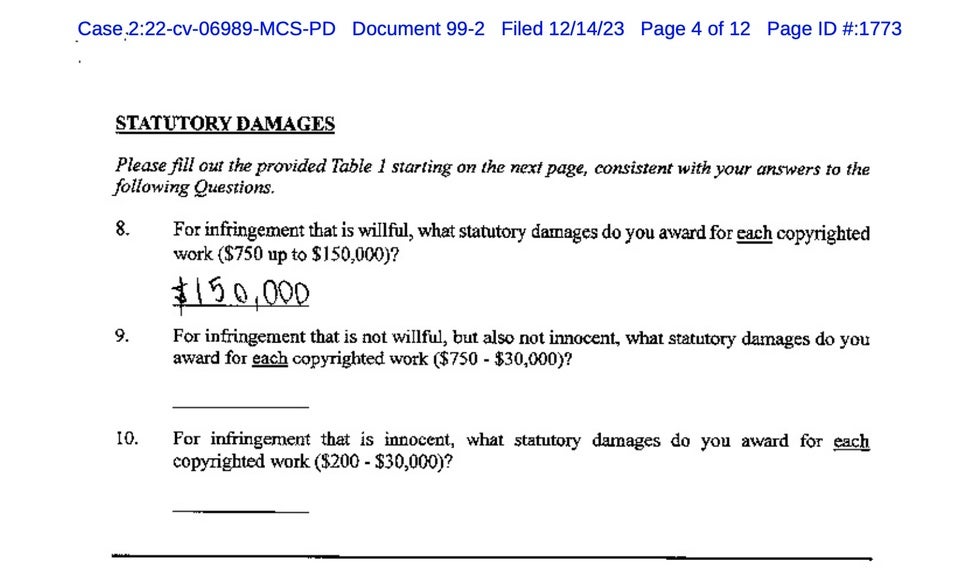 Here is a case from the opposite coast of the United States. This case may be looked at as persuasive authority in cases filed in the 9th circuit. Click here to see which states are covered by the 9th circuit.
Here is a case from the opposite coast of the United States. This case may be looked at as persuasive authority in cases filed in the 9th circuit. Click here to see which states are covered by the 9th circuit.
Hargis v. Pacifica Senior Living Mgmt., Ltd. Liab. Co., No. 2:22-cv-06989-MCS-PD, 2024 U.S. Dist. LEXIS 83362 (C.D. Cal. May 7, 2024) (following jury trial, entering $6,300,000 judgment for photographer plaintiff, representing $150,000.00 for each of 42 different photographs).
Attorney Steve® Tip: Plaintiff image counsel may cite this case to you to scare you or intimidate you into a settlement. There are some unique facts here you do not see in every case. See summary of Plaintiff counsel arguments set forth in their trial brief (below):
Basic Facts:
Plaintiff is an interior and architectural photographer who was retained by Atria Management Company to take photos of several of its senior living facilities. (FPCO 3, ECF No. 81.) Defendant acquired the facilities from Atria and featured 43 of Plaintiff's photographs, taken for Atria, on its websites without Plaintiff's consent or authorization. (Id. at 3-4.) In March 2021, Plaintiff's agent, ImageRights International, Inc., contacted Defendant and informed it that 16 of Plaintiff's photos had been featured on its websites and that those photo licenses were not transferable from Atria to Defendant. (Id. at 4.) At some point thereafter, ImageRights [*3] International, Inc. discovered that Defendant was using 27 additional of Plaintiff's photographs on its websites. (Id.) Plaintiff filed suit alleging Defendant infringed his copyrights on the 43 photographs. (Id. at 4-5.) The case proceeded to a jury trial on Plaintiff's claims. (Minutes, ECF No. 95.) The jury found that Defendant willfully infringed Plaintiffs' copyrights on 42 of the photos. (Verdict, ECF No. 104.)
The court discussed proving willful copyright infringement
To prove 'willfulness' under the Copyright Act, the plaintiff must show (1) that the defendant was actually aware of the infringing activity, or (2) that the defendant's actions were the result of 'reckless disregard' for, or 'willful blindness' to, the copyright holder's rights." Louis Vuitton Malletier, S.A. v. Akanoc Solutions, Inc., 658 F.3d 936, 944 (9th Cir. 2011) (quoting Island Software & Computer Serv., Inc. v. Microsoft Corp., 413 F.3d 257, 263 (2d Cir. 2005).). Willfulness under the Copyright Act can be proven by circumstantial evidence that gives rise to an inference of willful conduct. Microsoft Corp., 413 F.3d at 264; see Werner v. Evolve Media, LLC, No. 2:18-cv-7188-VAP-SKx, 2020 U.S. Dist. LEXIS 126589, at *4 (C.D. Cal. June 22, 2020).
Plaintiff's allegations (ultimately amounting to such a huge award)
Here were the factual arguments made by plaintiff counsel in their trial brief against the defendant:
- “Delete,” “Remove,” and “Deactivate” Are All Words That Evidence a Clear Intent to Destroy Evidence—When the Evidence Deleted, Removed, and Deactivated Is Missing. Pacifica deleted images and Pacifica directed its agents to remove images.
- Pacifica Knew That the Photos Were On Its Website After the Filing of the Lawsuit But Refused to Produce The Documents Evidencing Same Despite Its Discovery Obligations. The foregoing documents establish at a minimum that the photographs remained on Defendant's publicly-accessible servers well past the filing of the complaint—and thereby continuing to infringe under settled Ninth Circuit law. See, e.g., Bell v. Wilmott Storage Services, LLC, 12 F.4th 1065, 1073 (9th Cir. 2021). Further, the documents above establish concealment of infringement—which belies Defendant's knowledge that its actions were wrong, representing a blatant violation of Plaintiff's rights. Plaintiff has requested a jury instruction to allow the jury to consider Defendant's conduct in weighing the issues.
- The Evidence of Willfulness on the Part of Pacifica as to the Photos Is Overwhelming. Pacifica Ignored Hargis's Demand for Payment and Refused to Stop Its Infringement—and Proceeded to Infringe More Photos—for a Year and Half
Attorney Steve® Tip: As you can see, if the jury believes there is some foul play, destruction of evidence, and a failure to take down images after receiving a written notice or demand that a website or social media pages are using unlicensed images, this can create a very risky proposition for a potential defendant company. Bad facts can lead to maximum judgments, and failing to respond to or answer a complaint ("taking a default") can be costly, as this case indicated in California.